By: Winona Young, Features Editor
On Friday, August 2, the SFSS uploaded a Facebook post announcing their decision to host a Lennon Wall in Maggie Benston Centre in support of SFU students voicing their solidarity with Hong Kong protesters.
Yet, students may have missed previous post-it walls that went up earlier this summer outside of W.A.C. Bennett Library, and in the AQ Hallway — many were ripped and torn down.
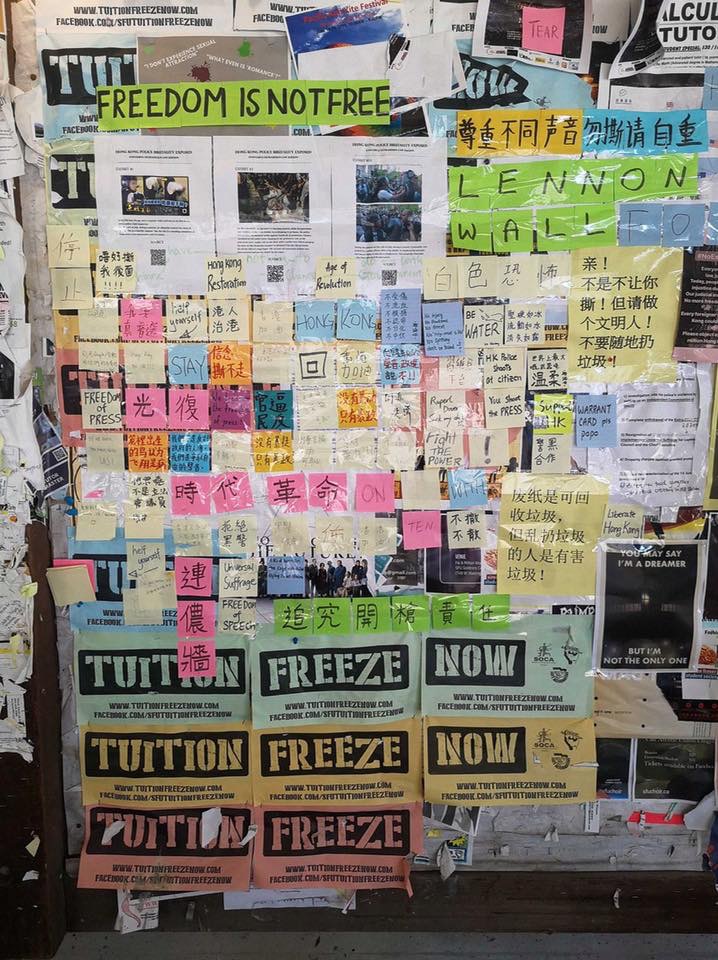
“Last week, several members of the Hong Kong community wrote encouraging messages of political and emotional support on a poster wall,” said Jeffrey Leung, a fifth-year computing science student and former SFSS director, in a Messenger interview with The Peak. The phenomenon of “Lennon Walls” at SFU were inspired by a local activist organization, Vancouver Hong Kong Political Activists. According to an email sent by an SFU student, who wished to remain anonymous, the Lennon Walls were made to feature supportive messages and stand in support of Hong Kong protesters. The Lennon Walls outside of W.A.C. Bennett Library and in the Academic Quadrangle were considered the first iteration of the SFU Lennon Walls.
“Soon after, [anti-protesters] tore down the messages to prevent the freedom of speech of the Hong Kong community, saying that Hong Kong should submit to China’s control,” alleged Leung. SFSS Vice-President of University Relations, Shina Kaur, corroborated Leung’s reports of vandalism in an email interview with The Peak.
“There were then successful attempts to tear down the posters and defame the sticky notes three nights in a row,” Kaur wrote.
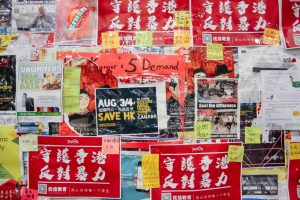
“I believe this happened because of the anonymity that is available with the bulletin board, since it is tucked away [sic] people are aware there are no consequences for writing something negative or tearing down posters,” she said.
Screenshots provided to The Peak by the aforementioned anonymous SFU student show a WeChat group chat entitled “SFU选课+找友+二手. . .” which contains over 400+ users. Hostile messages are shown in the screenshots which show several users speaking urging others to tear down Lennon Wall posters and signs.
Following the tearing down of the Lennon Walls at both locations, various SFU students sprung into action.
The second iteration of the Lennon Wall was created on Wednesday, August 31, 2019 by a group of Hong Kong students, who were not affiliated with an official group. Located in the AQ, students set up a booth, laptops, and signs with information about the Hong Kong protests. More notably, there stood a mini-wall of colourful post-its, many voicing support for the protesters, both in English and Cantonese.
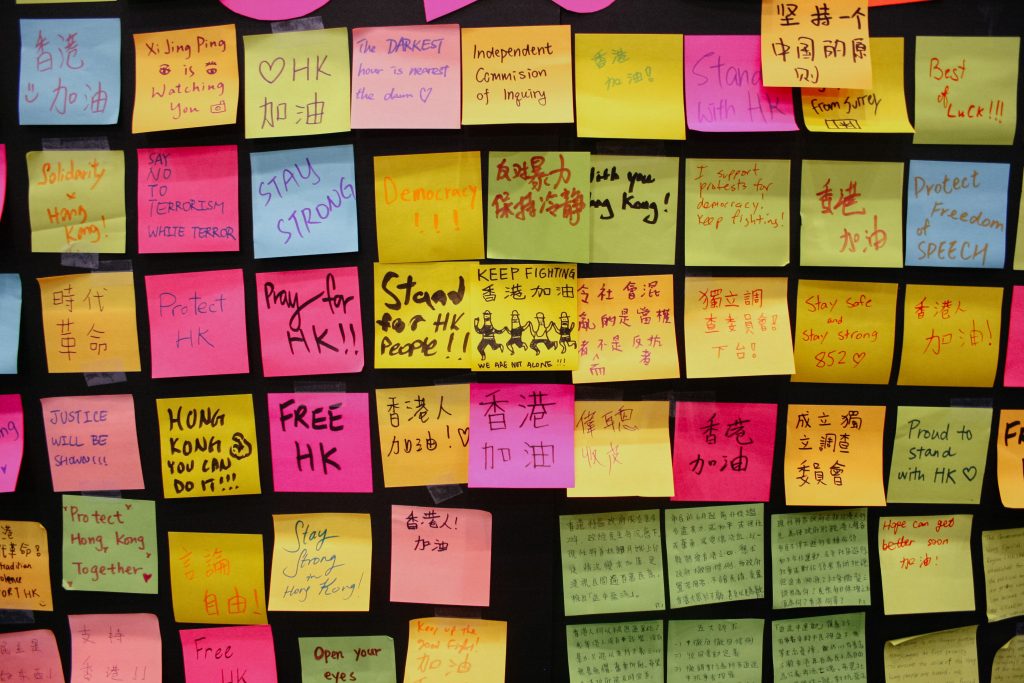
According to one of the students manning the booth, who asked to be anonymous, the group’s efforts all began with a Telegram group chat — Telegram being a popular Asian messaging app.
The student asserted that their main goal for this table was to not only provide support for Hong Kong students, but also to raise awareness on the Hong Kong protests. The students coaxed students of all backgrounds to write something for their Lennon Wall.
“Just be respectful, I encourage you to post anything onto the wall,” they said.
In an interview with The Peak, the aforementioned student wanted to emphasize that their motives for making the Lennon Wall were not political in any way.
“The purpose we are here not to raise a political stance because we come out after the Yuen Long attack,” they began. The Yuen Long Attack was a July 2019 incident wherein masked men attacked Hong Kong train-goers.
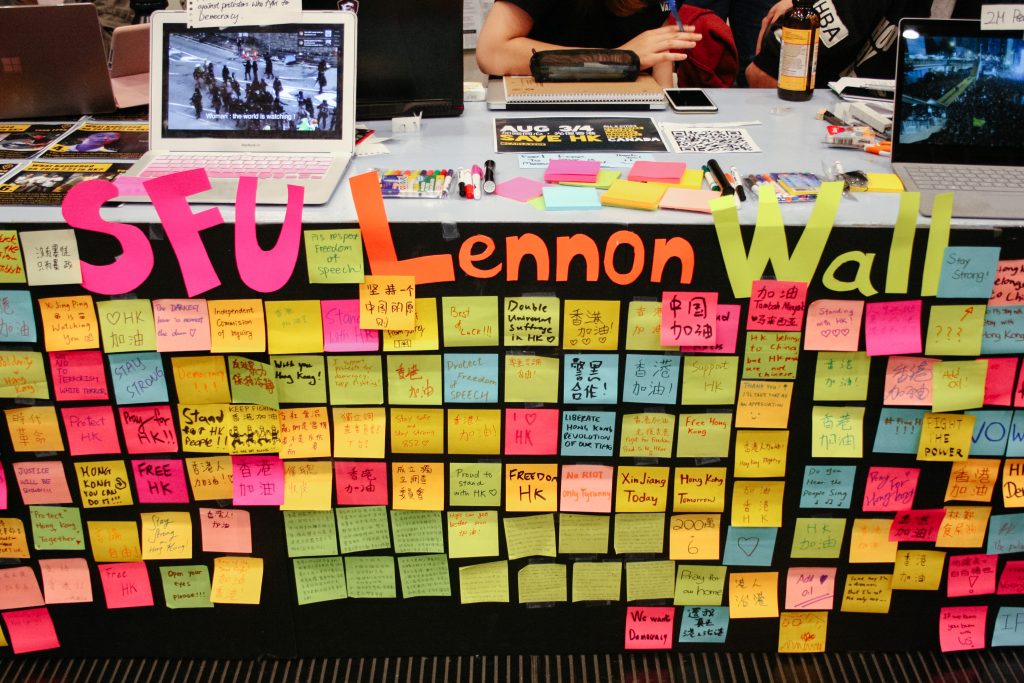
the second day of the Hong Kong students’ tabling / Photo: Gudrun Wai-Gunnarsson / The Peak
“I don’t want some of the people, from mainland China or different country, they are saying that we are doing [this] for the Hong Kong independence, that [is] totally false,” they continued. “We are not doing [this] for any political issue, or even [the] independence of Hong Kong, just for the human moral.”
Another student who acted in reaction to the first Lennon Wall’s defacement was fourth-year communications major Kayli Jamieson. She approached various SFSS members about installing a Lennon Wall at SFU.
“I added Giovanni [HoSang], Shina Kaur, Jessica Nguyen, and Christina Loutsik to a group chat on Facebook and sent them a very long paragraph [. . .] presenting the background of the issue as well as the proposal for the idea of having a designated official wall provided by the SFSS that can’t be torn down,” Jamieson wrote in a Messenger interview with The Peak.
However, the motion to approve the board was brought to a halt when concerns about safety were raised by staff who would be monitoring the rolling board. A board development session on August 1 then turned into an emergency board meeting to address the Lennon Wall immediately. This meeting occurred despite an earlier announcement on the Facebook group “Must Know Courses at SFU” by Jamieson stipulated the board’s approval.
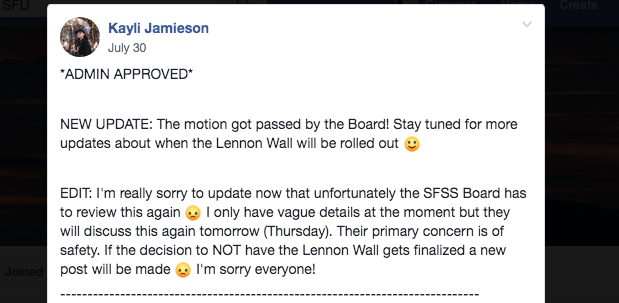
“After hearing [safety concerns], the SFSS decided it was best to put the project on hold until we had conversations with Campus Public Safety and the rest of the tenants in the Maggie Benston Center,” Kaur told The Peak.
“We wanted to ensure this was implemented with safety in mind for everyone involved. During that time we were also able to convene a board meeting and get an official stance of the society supporting freedom of expression.”
On the afternoon of August 1, Leung even made a brief appearance at the impromptu board meeting, and spoke on the Lennon Wall’s importance.
“[The SFU Lennon Wall] is a place of support and community which was attacked,” Leung said. “Bringing it back shows that freedom of speech cannot be suppressed, and shows China that the world is watching.”
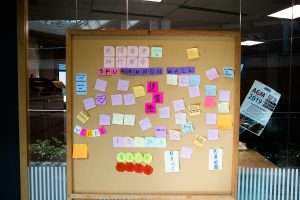
Soon after, the SFSS announced via Facebook that the Lennon Wall would be unveiled that Friday, August 1.
Kaur told The Peak the SFSS strives to support SFU students’ right to express their views safely and their condemnation of threats against supporters. These reasons were what swayed the board to approve the Lennon Wall.
“This Lennon Wall is a way to protect the right of free speech and political debate without intimidation,” Kaur said.
“We hope to continue an ongoing sense of comfort for the SFU student population to approach The SFSS with their concerns and allow us to support in the ways we are able.”




